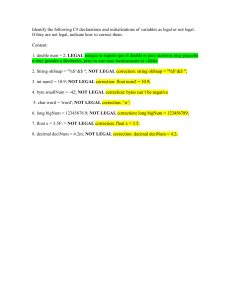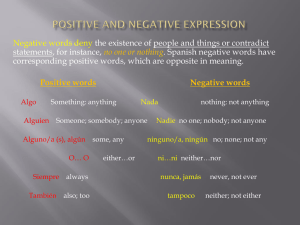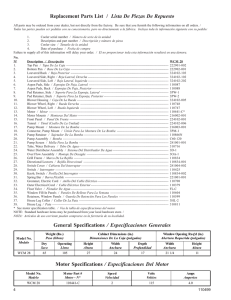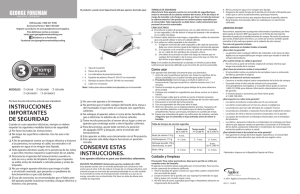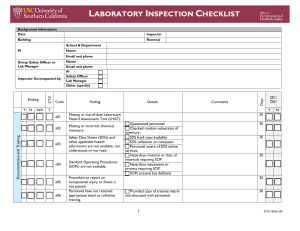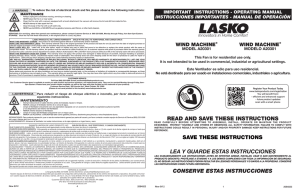INFORMATION ON RELEVANT ISSUES FOR PREPARATION OF STUDY ON THE... TO LIVE INDEPENDENTLY AND TO BE INCLUDED IN THE COMMUNITY...
advertisement
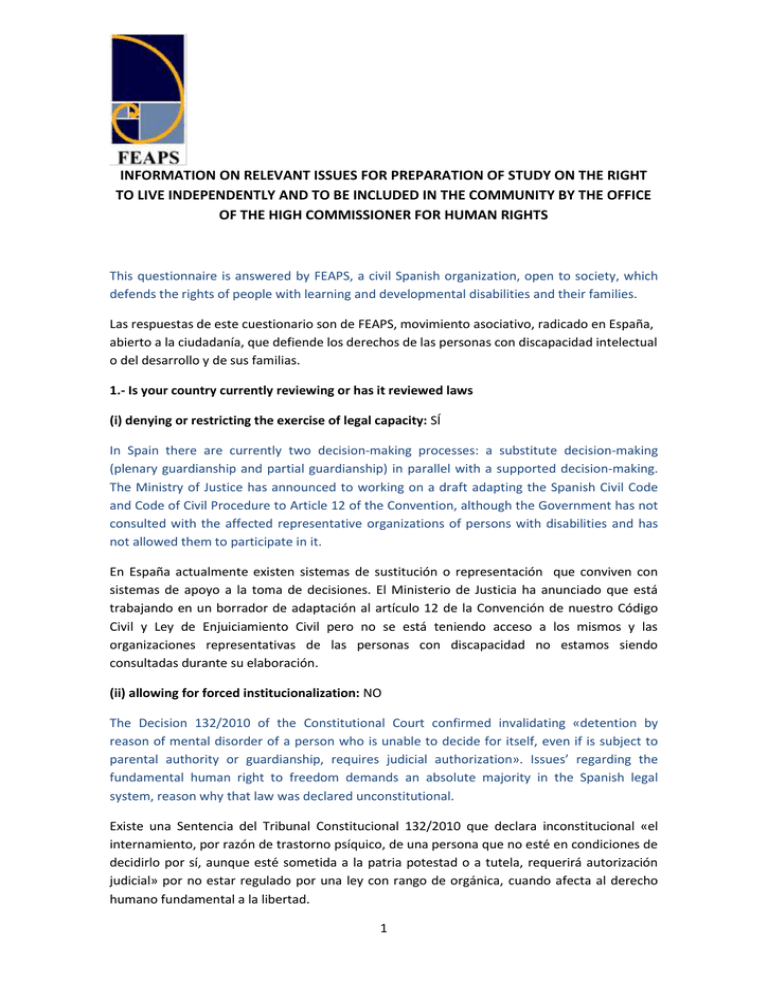
INFORMATION ON RELEVANT ISSUES FOR PREPARATION OF STUDY ON THE RIGHT TO LIVE INDEPENDENTLY AND TO BE INCLUDED IN THE COMMUNITY BY THE OFFICE OF THE HIGH COMMISSIONER FOR HUMAN RIGHTS This questionnaire is answered by FEAPS, a civil Spanish organization, open to society, which defends the rights of people with learning and developmental disabilities and their families. Las respuestas de este cuestionario son de FEAPS, movimiento asociativo, radicado en España, abierto a la ciudadanía, que defiende los derechos de las personas con discapacidad intelectual o del desarrollo y de sus familias. 1.- Is your country currently reviewing or has it reviewed laws (i) denying or restricting the exercise of legal capacity: SÍ In Spain there are currently two decision-making processes: a substitute decision-making (plenary guardianship and partial guardianship) in parallel with a supported decision-making. The Ministry of Justice has announced to working on a draft adapting the Spanish Civil Code and Code of Civil Procedure to Article 12 of the Convention, although the Government has not consulted with the affected representative organizations of persons with disabilities and has not allowed them to participate in it. En España actualmente existen sistemas de sustitución o representación que conviven con sistemas de apoyo a la toma de decisiones. El Ministerio de Justicia ha anunciado que está trabajando en un borrador de adaptación al artículo 12 de la Convención de nuestro Código Civil y Ley de Enjuiciamiento Civil pero no se está teniendo acceso a los mismos y las organizaciones representativas de las personas con discapacidad no estamos siendo consultadas durante su elaboración. (ii) allowing for forced institucionalization: NO The Decision 132/2010 of the Constitutional Court confirmed invalidating «detention by reason of mental disorder of a person who is unable to decide for itself, even if is subject to parental authority or guardianship, requires judicial authorization». Issues’ regarding the fundamental human right to freedom demands an absolute majority in the Spanish legal system, reason why that law was declared unconstitutional. Existe una Sentencia del Tribunal Constitucional 132/2010 que declara inconstitucional «el internamiento, por razón de trastorno psíquico, de una persona que no esté en condiciones de decidirlo por sí, aunque esté sometida a la patria potestad o a tutela, requerirá autorización judicial» por no estar regulado por una ley con rango de orgánica, cuando afecta al derecho humano fundamental a la libertad. 1 However, the decision itself states that: «The declaration of unconstitutionality of this law should not be linked to the declaration of invalidity since the latter would create a not desirable vacuum in the legal system, after not questioning its content. Moreover, as we recall in the aforementioned prior judgment on the issue of unconstitutionality No. 4511-1999, (LC 4), the possibility of not linking unconstitutionality and invalidity has been recognized in our jurisprudence». No obstante, la propia Sentencia establece que: «A esta declaración de inconstitucionalidad no debe anudarse en este caso la declaración de nulidad pues esta última crearía un vacío en el Ordenamiento jurídico no deseable, máxime no habiéndose cuestionado su contenido material. Por otra parte, como recordamos en la antes aludida Sentencia del día de hoy en la cuestión de inconstitucionalidad núm. 4511-1999, (FJ 4), la posibilidad de no vincular inconstitucionalidad y nulidad ha sido reconocida por nuestra jurisprudencia.» Although ‘forced internment’ was declared unconstitutional only due to a formal matter, the decisions that determine detentions are not to be found null. Still going on today. The State Attorney´s annual report states 58,156 new cases initiated in 2012. Esto supone que aunque se haya declarado inconstitucional el internamiento forzoso, es solamente por una cuestión formal y, por tanto, las resoluciones judiciales que determinan los internamientos no son nulas. A día de hoy, siguen produciéndose. La última Memoria de la Fiscalía General del Estado cifra en 58.156 el número de expedientes de internamiento incoados en el año 2012. (iii) establishing a presumption of danger to self or others on the basis of disability: NO The draft Penal Code which deals with the reform of the security measures is currently awaiting approval. Security measures are imposed to people with intellectual disabilities or mental illness exempt or partially exempt from criminal responsibility due to disability. Actualmente se está tramitando el anteproyecto de reforma del Código Penal que aborda la reforma de las medidas de seguridad. Las medidas de seguridad se imponen a las personas con discapacidad intelectual o enfermedad mental exentas o parcialmente exentas de responsabilidad penal debido a su discapacidad. The amendment establishes the duration of the measure will be decided according to a presumption of danger to others (peligrosidad) and security measures could last indefinitely for five years-periods. La reforma establece que la duración de la medida se establecerá en función de la peligrosidad de la persona y que las medidas de seguridad podrán alargarse de forma indefinida en el tiempo por periodos de hasta cinco años. (iv) providing for social protection schemes and medical institutions that include segregated settings for living: NO 2.- Does your country already have or is it currently developing a programme or plan to promote the implementation of services enabling independent living such as: personal assistants, home assistants or other community-based services regardless of the kind of imparment? If so, please provide information on these plans detailing sources of payment, control over the services and availability in all areas of the country. 2 In Spain, at the state level, the Law 39/2006 to promote personal autonomy and care for dependent people creates the provision of personal assistant. Payment of a benefit to hiring/recruit a personal assistant in order to provide the beneficiary person access to education and employment as well as independently life, is established. En España, a nivel estatal, la Ley 39/2006 de promoción de la autonomía personal y atención a las personas en situación de dependencia crea la prestación de asistencia personal. Se establece el pago de una prestación para la contratación de un asistente personal con la finalidad de facilitar a la persona beneficiaria el acceso a la educación y al empleo así como a una vida más autónoma. This benefit implementation is poorly developed in Spain, also is considered discriminatory as many Regions have established specific access requirements by obliging the beneficiary to have the ability to determine which services are required, to exercise its control and instruct the assistant how to perform. This requirement excludes persons with learning or developmental disabilities who lack this ability. Esta figura está escasamente desarrollada y es discriminatoria ya que en muchas Comunidades Autónomas se establece que entre los requisitos de acceso se encuentra el tener capacidad para para determinar los servicios que requiere, ejercer su control e impartir instrucciones al asistente de cómo llevarlas a cabo lo que excluye a las personas con discapacidad intelectual o del desarrollo que carezcan de esta capacidad. In fact, we cannot say there is fully provision in Spain as the benefit represents 0.19% of the total System Benefits since its inception in 2006 and have not been provided by many Regions. Esta figura en la práctica podemos decir que no existe ya que supone un 0.19% del total de prestaciones del Sistema desde su inicio en el año 2006 y hay Comunidades Autónomas en las que no se ha concedido ninguna. 3.- Does your country have effective mechanisms that persons with disabilities could successfully employ in case of denial of access to services enabling independent living and inclusion in the community including access to facilities for the general population on an equal basis with others? If so, do those mechanisms guarantee a reasonable accommodation when necessary services or support are not in place? Please, provide information on good practices. No, it does not have. No, no existen. The Spanish Royal Decree No. 1/2013, of 29 November, approving the Revised Text of the Law on the Rights of Persons with Disabilities and their social inclusion (former law), provides for a penalties system and other offenses relating to equal opportunities, non-discrimination and universal accessibility. En el Real Decreto Legislativo 1/2013, de 29 de noviembre, por el que se aprueba el Texto Refundido de la Ley General de derechos de las personas con discapacidad y de su inclusión social (y que proviene de una Ley anterior) prevé un régimen de infracciones y sanciones en materia de igualdad de oportunidades, no discriminación y accesibilidad universal. 3 It is an ineffective instrument due to a lack of Regions implementing since offenses are committed at that level. This has been one of the concerns expressed by the Committee on Rights of Persons with Disabilities during last Spain review in 2011. Este régimen es ineficaz debido a que las Comunidades Autónomas no lo han replicado y las infracciones se cometen a ese nivel. Esta ha sido una de las preocupaciones expresadas por el Comité sobre los derechos de las personas con discapacidad al realizar el examen de España en el año 2011. Equally, the concept of ‘reasonable accommodation’ for persons with disabilities is not being developed or recognized by the Government or private agents, not even judges and courts. De igual forma, el concepto de ajuste razonable no está siendo desarrollado ni es reconocido en general por las Administraciones, ni los agentes privados, ni los jueces y tribunales. Additionally if they go to court to claim their rights, it could take between one and three years before they are settled, if this can be achieved. Además, en el supuesto de que se acuda a los juzgados y tribunales a reclamar el derecho, se puede tardar entre uno y tres años en obtener el reconocimiento, si es que se obtiene. 4.- Does your country involved in international cooperation programmes related to ensurig the right to live independently and to be included in the community? If so, is your organization involved in any such programme? It does not involved in such programmes. No tenemos datos. 5.- Does your country collect statistics an disaggregated data on services provides to ensure independent living and inclusion in the community? It does not collect any statistics or data. No, no existen. Madrid, 31 de Julio de 2014 Inés de Araoz Asesora Jurídica FEAPS 4

